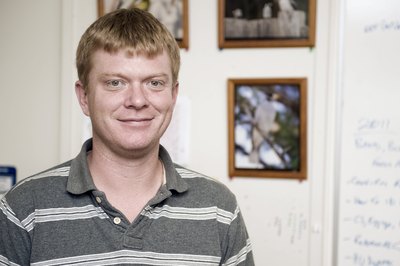UNE scientist wins Young Tall Poppy Award
Dr Paul McDonald, a lecturer in animal behaviour at the University of New England (UNE), has been honoured with one of this year’s Young Tall Poppy Science Awards for NSW. Dr McDonald is the only representative of a regional university among the nine young scientists presented with these awards during a ceremony at the Powerhouse Museum in Sydney late last month.

The award, by the Australian Institute of Policy & Science (AIPS), recognises Dr McDonald’s ability to conduct excellent scientific research and to communicate his findings - and his love of zoological science - to a wide and varied audience.
“All the awardees recognise the importance of scientific research and the more important goal of ensuring all society benefits from their shared knowledge,” said Camille Thomson, Acting Executive Director of AIPS.
As the recipient of a Young Tall Poppy Science Award, Dr McDonald will be visiting schools and attending seminars to engage with students, teachers, parents and the broader community as part of the AIPS Tall Poppy Campaign.
“Dr McDonald’s research seeks to understand both how and why animals cooperate,” his award citation reads. “He uses Noisy and Bell Miners - birds that live in complex societies similar to those of humans - as ideal model species for his research.
“Paul takes advantage of the public’s interest in birds to engage with them about his research into animal behaviour. He is curator of the Zoology Museum at UNE, managing visits from school groups and private visitors. He has also regularly prepared articles for the media, both newspaper and radio, as well as presenting to groups from Birdlife Australia and the Victorian Ornithological Research Group.”
“I’ve always been interested in animals - and birds in particular,” Dr McDonald said. “There are just so many unanswered questions in animal behaviour - and answering one question usually gives rise to several more.”
His work with Miners is enabling him to address some of these questions. Earlier this year he published research results showing that individual birds within a Noisy Miner colony can discriminate among the calls of individuals - even individuals from a distant colony.
“Their ability to attend to information encoded in their calls could contribute to the complexity of their social organisation,” he said. “The more we look at these species, the more we realise just how complex their society actually is.”
His research into the cooperative behaviour of Miners has broad ecological implications. For example, together with one of his postgraduate research students, he’s investigating the contribution of Bell Miners to the phenomenon of forest dieback. The aggressive Miners can exclude other birds from forested areas - birds that eat the parasites responsible for dieback.
Having young children of his own, Dr McDonald is used to answering children’s questions about animals and birds and is looking forward to more contact with school groups.
“I love working with kids and seeing how they’re thinking,” he said. “You’re never sure what questions are going to come.”
QIMR Berghofer signs strategic partnership with Nakanoshima Qross
QIMR Berghofer and Japanese biomedical innovation hub Nakanoshima Qross have signed a strategic...
Dr Chris Baldwin is new HaemaLogiX CEO and Managing Director
Having commenced in January, Dr Chris Baldwin is clinical stage Australian biotechnology company...
Vaxxas appoints former Merck Global Vaccines President David Peacock as CEO
To lead the commercialisation of Vaxxas's proprietary high‑density microarray patch (HD‑MAP)...



